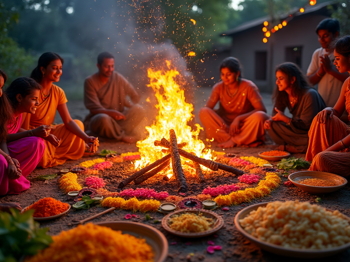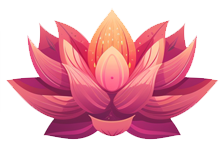



Bhogi is a significant and vibrant festival celebrated primarily in the southern states of India, particularly in Tamil Nadu, Andhra Pradesh, Telangana, and Karnataka. It marks the beginning of the four-day harvest festival known as Pongal, which is dedicated to the Sun God. Bhogi is observed on the first day of Pongal, usually on January 13th, and is a day of immense cultural and spiritual importance. The festival symbolizes the discarding of old and unwanted things, paving the way for new beginnings and a fresh start. People come together to celebrate by cleaning their homes, decorating them with rangolis, and performing rituals to honor the deities and ancestors.

The Bhogi Puja is central to the Bhogi festival and carries deep cultural and spiritual significance:
Purification and Renewal: Bhogi Puja represents the cleansing of the mind, body, and surroundings. By discarding old belongings and negativities, devotees prepare themselves for new opportunities and positivity in the coming year.
Agricultural Importance: As a harvest festival, Bhogi Puja is also an expression of gratitude towards nature for providing a bountiful harvest. It marks the end of the winter season and the beginning of a new agricultural cycle.
Spiritual Upliftment: The ritual of Bhogi Mantalu, where old items are burned in a bonfire, symbolizes the destruction of evil and the victory of good. It is believed to burn away past sins, bad habits, and negative energies, leading to spiritual renewal.
Unity and Togetherness: Bhogi Puja brings families and communities together, reinforcing social bonds. The collective participation in rituals and festivities strengthens the sense of unity and shared cultural heritage.
Cleansing and Renewal: Engaging in the ritual cleaning and discarding of old items helps to declutter both the physical space and the mind, leading to a more organized and peaceful environment.
Spiritual Purification: The puja and bonfire are believed to purify the soul, removing past sins and negative influences, thereby promoting spiritual growth and positivity.
Enhanced Agricultural Productivity: By honoring nature and the elements, Bhogi Puja is thought to invoke blessings for a prosperous harvest season and abundant crops.
Family Bonding: The festival provides an opportunity for family members to come together, share traditions, and strengthen their relationships through collective celebration.
Mental and Emotional Well-being: Participating in the festival rituals and the process of letting go of old burdens can bring about a sense of relief, emotional balance, and mental clarity.
Cultural Preservation: Bhogi Puja helps in preserving and passing down traditional values and customs to future generations, ensuring the continuity of cultural heritage.
Bhogi, with its emphasis on renewal, gratitude, and community, is a festival that not only marks the change of seasons but also encourages personal and collective growth.
Bhogi is a traditional festival celebrated in South India, particularly in Tamil Nadu, Andhra Pradesh, and Telangana. It marks the first day of the four-day Pongal festival, which usually falls in mid-January. The festival is dedicated to Lord Indra, the god of rain and clouds, and is celebrated with the intention of discarding the old and welcoming the new. Here is a step-by-step procedure to perform Bhogi:
By following these steps, you can perform Bhogi with traditional practices and celebrate the festival in its true spirit.